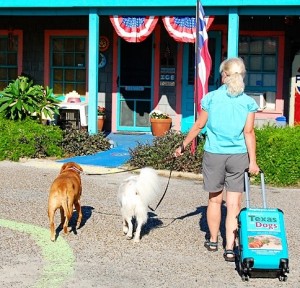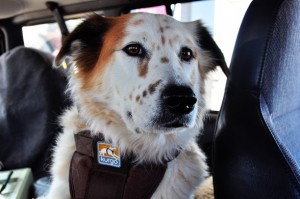Six Top Tips For Traveling With Your Senior Dog
Guest post by Paris Permenter
Imagine retirement and you just might picture a life filled with travel to the places you’ve always wanted to visit. As long as you’re healthy, there’s no reason not to get out and enjoy all that life has to offer, right?
Well, it’s just the same for our dogs. Many canines enjoy spending their retirement years just like we humans do: on the road with  their family members! If your dog is in good health and enjoys getting out and about, his senior years can be a time of active fun.
their family members! If your dog is in good health and enjoys getting out and about, his senior years can be a time of active fun.
We love traveling with our rescue dogs Tiki and Irie, now six and seven years old, respectively, and we intend to continue traveling with them as they mature. Unlike puppies or restless younger dogs, they’re happy to hang out with us, whether that means a day of driving with stops for potty breaks and picnics or a day at a hotel.
Through the years, we’ve seen them in many different situations with all kinds of people, so their behavior on the road as they greet strangers is far more predictable than when they were puppies. We also know what kinds of activities and settings they’ll enjoy. That helps us plan suitable family itineraries, especially stops in which our shy Irie will thrive. It’s a familiarity that comes with years of watching our best friends in all kinds of environments.
 Traveling with an older dog, as with any dog, involves pre-trip planning to keep your dog comfortable and safe. Preparations we always take include:
Traveling with an older dog, as with any dog, involves pre-trip planning to keep your dog comfortable and safe. Preparations we always take include:
- Talking to our vet. Our first stop in the planning of a long trip is to talk with our veterinarian. She always checks our records and lets us know if we need to make any special preparations in terms of immunizations or preventatives, depending on destination. While there, we make sure to have copies of our dogs’ immunization records to carry on the trip. Although our dogs aren’t currently on any medications, with our previous dogs, we checked with our veterinarian for any special instructions on administering and storing medications during travel.
- Bringing the comforts of home. We always carry a cushioned dog bed in the back of our Jeep. Memory foam beds help keep pressure off joints, especially important for older dogs.
- Avoiding tummy troubles. No one wants a tummy ache when traveling, and that includes our dogs. We avoid stomach stress by packing our dogs’ usual food and treats.
- Planning stops. We plan hotel stays and attraction stops in advance—and double check with a quick call before we leave home. Avoiding stress on our end means less stress for our dogs, too.
- Staying flexible. While we do a lot of planning, we don’t adhere to a strict timetable. Instead, we leave plenty of time for frequent bathroom breaks, especially important for seniors, and for walks to just sniff around and enjoy the new destination.
- Preparing for problems. As with any travel, it pays to hope for the best and prepare for the worst—and that includes composing a list of veterinarians and emergency vet hospitals along our route and at our destination. We also plan for more routine issues including potty accidents. Along with paper towels and waste bags, we carry a urine remover to make sure we
 never lose a hotel pet deposit.
never lose a hotel pet deposit.
But maybe the best preparation we make is the resolution to slow down and enjoy the pleasures of traveling with our dogs. Taking the time to stop and sniff the roses (and other interesting stuff!) is what travel’s all about—regardless of age.
About the Author: Paris Permenter is the co-publisher of DogTipper.com and CatTipper.com. Along with her husband, John Bigley, Paris has authored 33 pet and travel books including DogTipper’s Texas with Dogs (Open Road Guides, distributed by Simon & Schuster).



